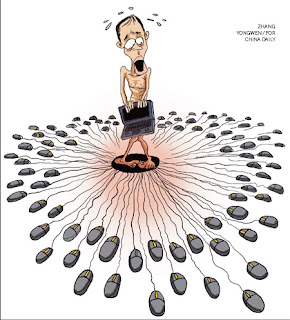There are certainly many ways to define the state of the present world with the development of new communication technologies. In Sherry Turkle’s Alone Together, she implies that the powers accumulated from new technologies and on line social networks are producing a certain segment of humanity for some part of the world, while creating havoc and misery for another.

Sometimes, I do feel that new communication technologies are racing ahead of our ability to come to terms with the consequences engendered by them. On the one hand, on line communication enhances the global diversity of cultures, religions and societies, on the other hand, on line community also becomes a chaotic space where different traditions, ethics and identities clashes, even as some has proclaimed "the end of civilization.”
 In our class, we mostly discussed social networks issues in the US culture and internet system. As an international student from China, I tend to reflect what I have experienced in the US with my life in China. Here, I would like to put forward my discussion by introducing some different features in the Chinese on line communities.
In our class, we mostly discussed social networks issues in the US culture and internet system. As an international student from China, I tend to reflect what I have experienced in the US with my life in China. Here, I would like to put forward my discussion by introducing some different features in the Chinese on line communities.In China, with the regulation of censorship, blogs are not as prevalent as they are here in the US, due to the ease with which personal information can be leaked. However, on line communities still are very active in the entire Chinese social diaspora. The perceived anonymity of the Internet combined with a forum for expressing opinions and discussing various topics have proved dynamic and successful in the Chinese social networks, although more controversial topics are often removed within a short time by the Internet regulators.
 Hindman notes that “the internet clearest political impacts, come from the scandals that it has exposed, or at least allowed to unfold more rapidly”. Chinese on line communities have uncovered several scandals. One latest example is Sinopec, the largest Chinese national gasoline company spent 1.68 million Chinese yuan (US 258,000) to buy wines for the company’s party. This was brought to the public light in a topic in 2011 on the popular Chinese language Internet community: Tianya Community. After being discussed on Tianya, it spread to the entire country and from there on evolved into a news item worthy of international attention. It was subsequently brought to an end by the Chinese central government. This case shows how powerful and valuable on line community could function in a country lacking real free speech in other public channels.
Hindman notes that “the internet clearest political impacts, come from the scandals that it has exposed, or at least allowed to unfold more rapidly”. Chinese on line communities have uncovered several scandals. One latest example is Sinopec, the largest Chinese national gasoline company spent 1.68 million Chinese yuan (US 258,000) to buy wines for the company’s party. This was brought to the public light in a topic in 2011 on the popular Chinese language Internet community: Tianya Community. After being discussed on Tianya, it spread to the entire country and from there on evolved into a news item worthy of international attention. It was subsequently brought to an end by the Chinese central government. This case shows how powerful and valuable on line community could function in a country lacking real free speech in other public channels. Another popular feature of the Chinese online presence is what has been called “human-flesh searching”. In the Chinese culture, personal privacy is often ignored or sacrificed for public collective reasons (there is a cultural joke that China is called socialistic that people are supposed to share everything with others). When the human-flesh search engine is in operation, the Chinese online communities will use their extensive contacts and its vast population as a resource to try to find a person based on just one photo or traces of information left by the information provider in cyberspace. This can sometimes be magical and interesting, as was the case when a Chinese on line community tried to find an “Obama beauty” captured on a news photo documenting the US President Obama’s speech in Shanghai.
Another popular feature of the Chinese online presence is what has been called “human-flesh searching”. In the Chinese culture, personal privacy is often ignored or sacrificed for public collective reasons (there is a cultural joke that China is called socialistic that people are supposed to share everything with others). When the human-flesh search engine is in operation, the Chinese online communities will use their extensive contacts and its vast population as a resource to try to find a person based on just one photo or traces of information left by the information provider in cyberspace. This can sometimes be magical and interesting, as was the case when a Chinese on line community tried to find an “Obama beauty” captured on a news photo documenting the US President Obama’s speech in Shanghai.Despite the content of the Obama’s speech, the Chinese on line community instead focused on a mystery beautiful woman in the audience, and they started to “human- flesh search” and she was eventually found after two weeks. However, this also spawned another huge discussion in the on line community on whether she intended to expose herself or not.

Sometimes, the human-flesh searches are of a more vindictive nature and resemble a modern lynching. People who have been deemed evil by the collective mind of the Chinese on line community risk being hunted down. Such was the case when a 21-year-old Chinese girl Gao Qianhui posted a video of her criticizing how the TV-schedule had been altered after the 2008 Sichuan earthquake. Chinese on line community disclosed her personal information on the Internet, and surprisingly, she was then detained by local policemen who were sympathetic to the action of the on line community, although she had committed no crime.
 Human-flesh search engine is considered as an advance of combination of human resource and new communication technologies. It helps people to collect information censored or ignored by the Chinese pubic media. On the other hand, it also could be a tool used by people to mobilize for less than noble reasons.
Human-flesh search engine is considered as an advance of combination of human resource and new communication technologies. It helps people to collect information censored or ignored by the Chinese pubic media. On the other hand, it also could be a tool used by people to mobilize for less than noble reasons.The paradoxical functions of human-flesh search engine in the Chinese on line community make me wonder whether there should be certain ethical agreement in the one line communities, especially in the developing areas where the overall education and judicial system are still not in an advanced level. Both Turkle and Hindman warn us not to romanticize the vantage of openness and new technology of on line communication. As many continue to celebrate the democratic nature of blog, it is important to acknowledge that “many voices are still left out,” and there will always be a possibility that some people will abuse the human flesh search to the detriment of others. How do we make on line community a more open and safe space for the world? Will education and accessibility to the open internet eventually solve all the problems? These questions will continue to haunt me throughout this class.


Sources of images (in order of appearance):

I just read another very interesting article concerned with Chinese Huam-flesh searching on http://www.nytimes.com/2010/03/07/magazine/07Human-t.html
ReplyDeletePlease check it out if your are interested:)
Wow Bin, your post and the NYT article really helped me get a grasp on this phenomenon that I didn't know anything about before. It's really interesting how quickly a search for information can polarize types of behaviors.
ReplyDeleteBin,
ReplyDeleteI didn't know about this type of human-flesh search...Seems a bit similar to facebook with regards to "finding" people that you are "seeking" for one reason or another. I'm wondering to what extent the ability to rapidly congregate in an online community can create the atmosphere of mob mentality just as easily as it can IRL, not just for this site, but in general? hmmm. Here we can see where the web is kind of the tool used to begin what will become, possibly, a violent reality.
I like the panda pic haha
ReplyDeleteThanks, guys for your comments. I like the panda pics too...Hilarious.
ReplyDeleteI hope through analyzing this phenomenon, people could reconsider the so called openness of internet and how dangerous it could possibly be in "a violent reality".
Sooo. I am curious about the use of "Flesh" in this practice. In context, it seems an idiomatic expression for "actual person." But when I just see the term, it sounds like a service for cannibalism or prostitution. It seems like the practice so named is negotiating differences between information (data) and bodies -- perhaps privileging of searches by social networks (i.e. actual flesh and blood people) over those by search engines.
ReplyDeleteHuman-flesh search engine is a direct translation of its Chinese term " Ren rou sou suo." It is a new word even in Chinese. Renrou means human flesh...I guess here instead of defining it as human search engine. Human flesh is a more negative and resentful term. It sounds like..Look, I am searching you, not because I treat you as a human but a piece of meat.
ReplyDeleteBeing something of a cultural heathen — I’ve spent so much trying to figure out my own culture, I know virtually nothing about any other cultures — to me this human flesh search engine sounds like something sinister out of a fever dream.
ReplyDeleteThe concept reminds me a bit of Mulvey’s sadistic-voyeuristic gaze: if someone poses a threat to the source of power, objectify him or her (lemme guess, her?) and delight in her/his punishment. It also reminds me of The Running Man and the way the state put the hunted guys on TV to get the masses riled up to hunt them.
Again, it comes back to one of the tensions of online democracy that the NPR podcast highlighted: the marginalized can use Facebook for good, but the Empire will always strike back. We hedge our bet that the tactics of the righteous will unravel the strategies of the powerholders … but if not?